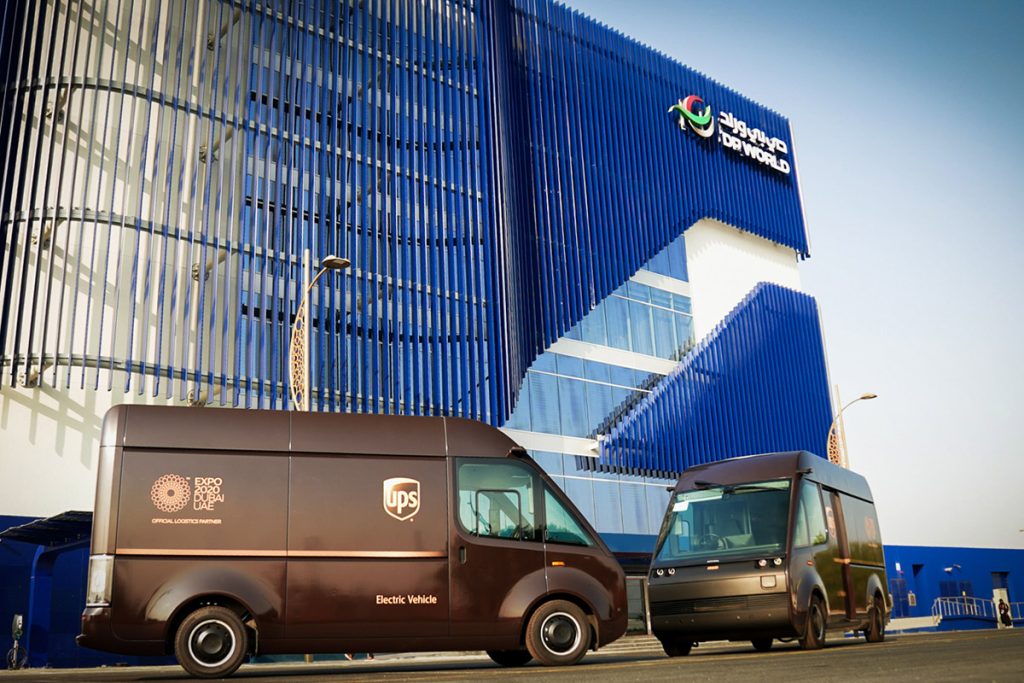
UPS is testing three new technologies at Expo 2020, including lightweight electric vehicles, e-assist quad cycles, and a circular power supply solution
Global delivery giant UPS has been using Expo 2020 Dubai as a testbed for nascent sustainable technology, Peter Harris, vice president of international sustainability at UPS told Arabian Business.
UPS has set a carbon-neutral goal for 2050, with benchmarks dotted along the 27-year road to 2050, including using 40 percent renewable fuel in its fleet by 2025. By 2035, they have their eyes set on reducing the carbon intensity of a package by 50 percent, and by the same year, sustainable aviation fuel will comprise 30 percent of the airline’s fuel mix.
“We’re using Expo 2020 as an opportunity to lay out our vision of the future of sustainable urban logistics,” Harris said.
UPS is testing three new technologies at Expo 2020, including lightweight electric vehicles and e-assist quad cycles. The shipping giant has partnered with two start-ups, Arrival and Fernhay, to develop and scale the vehicles that UPS is hoping will shake up urban logistics.
“We often work with start-ups because that’s where we find a lot of innovation potential,” Harris said.
The third piece UPS is testing at Expo is a circular power supply solution.
“It’s all very well to have the vehicles, but if you can’t charge them, then they’re of no use,” he said, adding they’ve brought the “world’s first-fleet scale combined smart grid and energy storage solution” to Expo.
Harris said that Artificial Intelligence has to be a big piece of the power generation puzzle.
“We, as society, have to be able to use AI effectively to manage that transition, or we’ll find ourselves forever in a world building bigger and bigger assets to manage the distribution of that power. AI can help us to manage that transition in a much more cost-effective way that allows the transition to take place more rapidly,” he said.
Using Expo 2020 as a testing ground, UPS hopes that they can roll out the solutions on a larger scale after the six-month event.
“After Expo 2020, we’ll be able to turn it into a legacy both in the local business, in the UAE, and globally,” Harris said.
UPS has set lofty sustainability targets, but reaching them, like for many other companies, requires technology to advance and scale. It’s not necessarily that all the technology isn’t there, it’s just not affordable right now – similar to the case of solar panels a couple decades ago, the cost of which has fallen by 80 percent since 2009, a new report from the US Department of Energy found.
Costs of electric vehicles have begun falling, with BloombergNEF forecasting that by 2027, electric cars and vans will be cheaper to produce than conventional fossil fuel-powered vehicles.
Start-ups are famously a hotbed for innovation, but, without support and investment, risk falling into the so-called valley of death where they’re unable to scale.
“The challenge [of working with start-ups] is in terms of the potential stability and the ability of start-ups to grow, and it’s important to that end that organisations like UPS are able to think about long-term partnerships,” Harris said.
On the electric vehicles that Arrival produces, Harris said UPS has committed to purchase 10,000 vehicles, and the company is now at the stage where “we’re moving from experimentation or prototype into production over the next year or so.”


